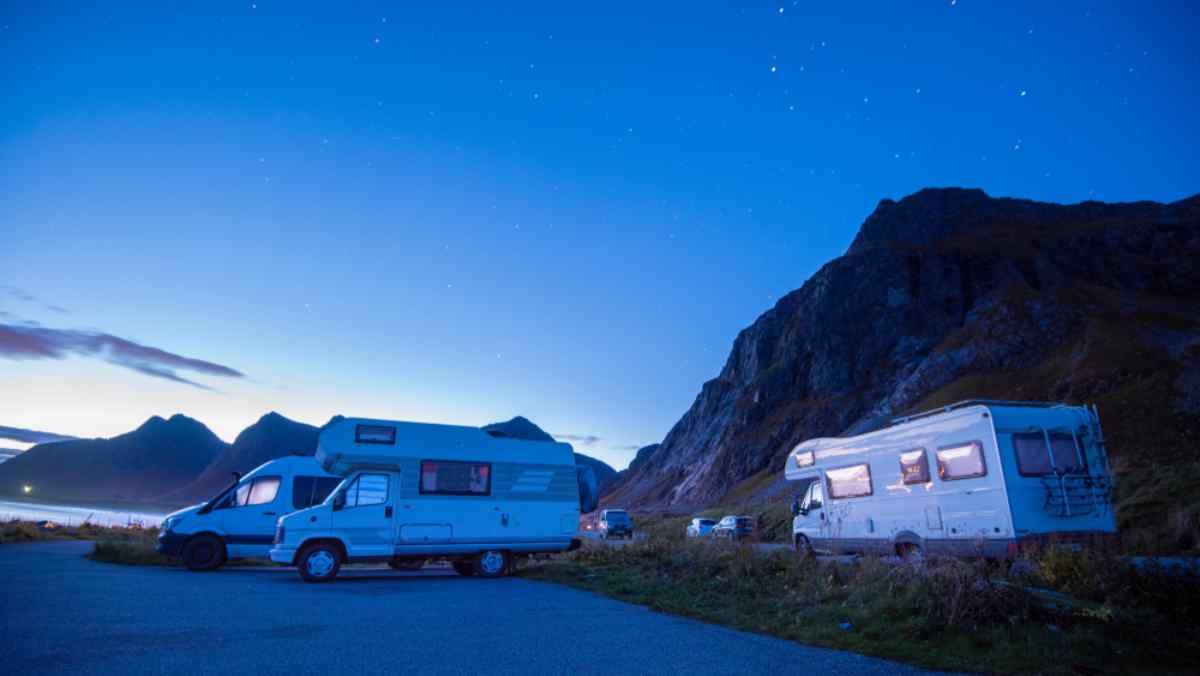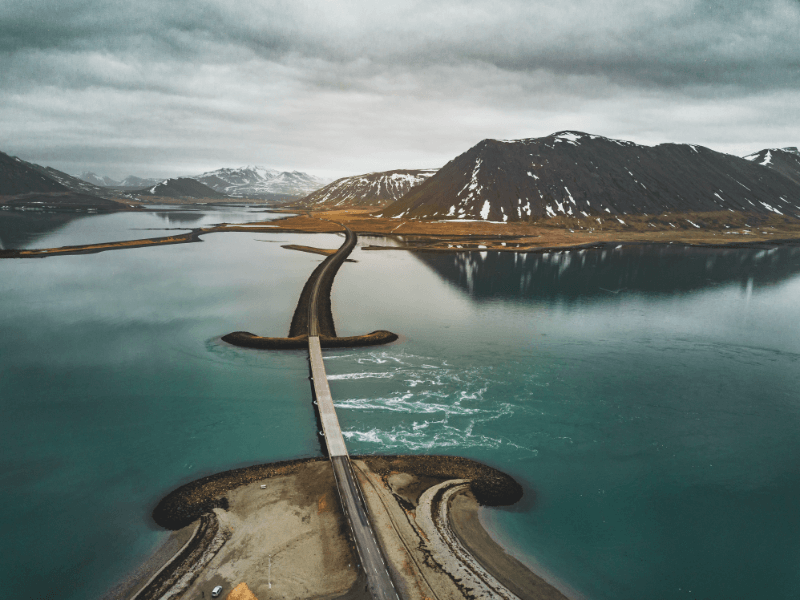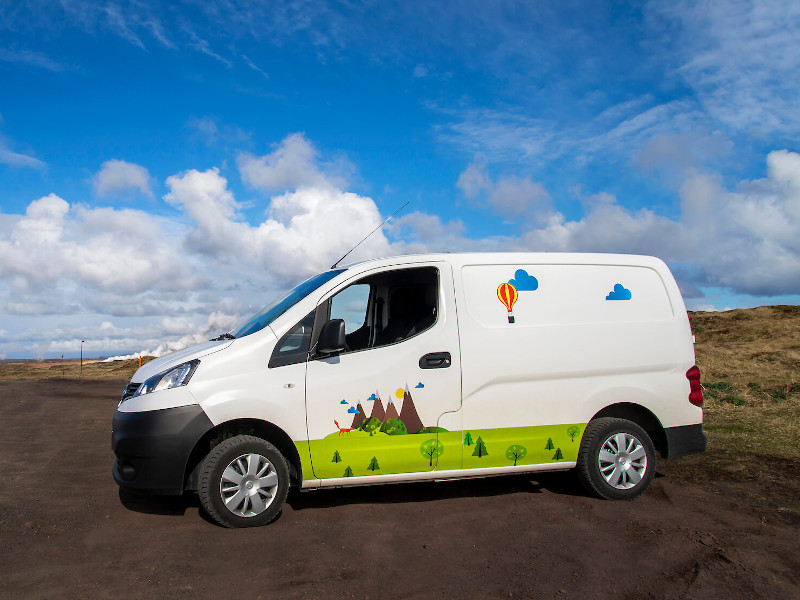Driving the Arctic Highway in Norway is a spectacular way of exploring the country, and there’s no better (or more convenient) way to take on a road trip than with a campervan. With views of the breathtaking Norwegian landscape and all its interesting sights, the tranquil fjords, the majestic mountains, and the seemingly endless blue of the ocean, this is one drive you won’t soon forget.
This article will tell you everything you need to know about the Arctic Highway in Norway: what makes it such a special road trip route, when the best time to drive the Arctic Highway is, how to best prepare for your journey, and much, much more. So, without further ado, let’s dive into what this magical route has in store for you.
The Arctic Highway in Short
The Arctic Highway is a scenic route in Norway that runs north from Mo i Rana, Nordland County, to Nordkapp (the latter being Europe’s northernmost point accessible by road). The route is 1126 kilometers (+/- 700 miles) long and is credited with incredible scenery. If you have to drive the entire route in one go, it’ll take you nearly 17 hours, hence why it’s best taken on as a more relaxed road trip.

It’s also important to note that this is a toll route (easily payable online) and includes a ferry crossing. The Arctic Highway is essentially a part of the much larger E6 route that runs through Norway from the south to the north and already starts all the way from the Swedish border
Why Travel the Arctic Highway via Campervan?
Road-tripping the Arctic Highway with a campervan has many benefits:
It Offers the Ultimate Freedom and Flexibility
Unlike traveling with a tour group, you’re in complete control of your trip: where you want to go, what you want to do, and when you want to do it. You’re also not being dictated by pre-booked accommodation check-in times and can easily find an impromptu overnight camping spot at one of the various campsites across the country. So renting a campervan in Norway guarantees you flexibility and control on your trip.
It Offers the Ultimate in Convenience and Comfort
You are literally driving around with your entire house; what could possibly be more convenient? The fact that you can travel with that kind of shelter and all your creature comforts with you also makes camping a whole new experience.
It Offers the Ultimate in Cost-effective Travel
One of the most expensive elements of any trip is your accommodation. By renting a campervan, you would’ve sorted out both your transport and accommodation in one go, and you can’t even begin to compare the price of camping (ranging from free for wild camping to an average of $55 per site per night) to the price of a hotel (averaging $220 per person per night).

Planning Your Journey
Below, we address some of the basics required to plan your Arctic Highway drive.
The Best Time to Drive the Arctic Highway in Norway with a Campervan
The Arctic Highway offers completely different experiences at different times of the year, so it will ultimately be up to you which one will suit you the best. Here’s what to consider:
Driving the Arctic Highway During Our Summer Season (June to August)
- During the summertime, temperatures reach an all-time high, and the weather is nice and mild, not only making driving an absolute pleasure but also allowing for a jam-packed itinerary filled with all sorts of exciting outdoor adventures.
- You don’t need to fear any sudden road closures due to harsh weather conditions, so the odds of any road trip plans getting derailed are practically zero.
- All campsites will also be open, so you won’t need to do such extensive research when it comes to where you’ll be overnighting.
- If you visit in mid-summer, you can experience one of our famous natural phenomena, the Midnight Sun, when it never gets dark and you experience a 24-hour day.
- Summertime in Norway is considered peak season, so you’ll experience price hikes and more traffic (both on foot and on the road).
- The Norwegian landscape during this time is vibrant and lush with sparkling fjords and bright green vegetation, so if that’s what you’ve envisioned when visiting Norway, then summer is the perfect time for your trip.

Driving the Arctic Highway During Our Winter Season (November to March)
- During the wintertime, temperatures reach an all-time low, and weather conditions can become pretty harsh (especially the further north you go). Although the Arctic Highway is kept pretty well-maintained throughout, road conditions can become extremely challenging. Needless to say, the weather also makes our outdoor activities, such as hiking and canoeing on the fjords, a no-go.
- Sudden road closures are also possible depending on how bad things get, and some of our mountain roads will be completely out of the question (if you’re planning on taking a few offroads), with some, such as Route 63, even closed on an annual basis throughout the colder months of the year. This will require some extra flexibility and planning for your road trip.
- Due to the road and weather conditions, you’ll need some additional gear and accessories, such as winter tires and ice scrapers, when driving a campervan on the Arctic Highway. If you’re unsure what’s included in your rental, please chat with your rental agent. In general, we also highly recommend opting for a 4x4 campervan during this time.
- Some of our campsites are closed during the winter season, so once again, some extra research and planning will be required.
- Wintertime is the ideal time to spot another natural phenomenon, the Northern Lights, here in Norway. Seeing the bright neon lights dancing across the sky is quite a magical experience.
- Winter is considered our “down” season, except for the period over the festive season and New Year. This means you’ll be able to find plenty of specials and discounts, and our roads and attractions will be less crowded.
- The Norwegian landscape during this time turns into a winter wonderland covered in a thick blanket of ice with icy tentacles sparkling all over, and many scenes seemingly frozen in time. So, if you’re a fan of the movie Frozen and any of the myriad Hallmark Christmas movies – winter in Norway will be your jam.

A Few Highlights Along the Arctic Highway
As you can imagine, the Arctic Highway has plenty of unforgettable natural sights and interesting attractions, and activities along the way. These are just a few you can consider adding to your trip itinerary:
Setergrotta and Gronligrotta Caves
The Setergrotta and Gronligrotta Caves are limestone caves that can be accessed via guided tours. These underground wonders are found near Mo i Rana.
Krokstrand Fjellpark
Krokstrand Fjellpark promises an entire day filled with family fun. This adventure park offers all sorts of exciting activities and outdoor adventures, such as mini golf, kayaking, playgrounds, treetop climbing and zip-lining, and much, much more.
Saltfjellet-Svartisen National Park
At a certain point, you’ll cross the breathtaking Saltfjellet-Svartisen National Park with its mesmerizing mountains and the Svartisen Glacier (Norway’s second-largest glacier).
Fauske Bygdetun (Fauske Folk Museum)
At Fauske Bygdetun, you can dive into the Norwegian culture and history and see firsthand how people used to live in this area. The museum makes for a great family outing; just keep in mind that much of it is outdoors, so visiting during the colder months might be a bit uncomfortable.

Narvik War Museum
This museum is a must for anyone interested in World War II history. The Narvik War Museum not only dives into the war but also into the role Narvik played as an important port city and battleground during the war.
Kvænangsfjellet Mountain Pass
The Kvænangsfjellet Mountain Pass is a part of the E6 that’s famous for its spectacular panoramic views across the Norwegian landscape with its majestic mountains and beautiful fjords. But please note that this is one of those mountain passes we spoke about earlier that is often closed during the winter due to weather conditions.
Malselvfossen Waterfall
Malselvfossen Waterfall might not be what you’re used to when you envision a waterfall. Malselvfossen only has a drop of 10 meters in two tiers, but it’s the power of the rushing water and the incredibly breathtaking scenery that surrounds it that make it a popular stop along the way.

Lyngen Alps
Here, you’ll be forgiven for thinking you’ve suddenly been transported to Switzerland. The dramatic mountain range, with its alpine peaks, is a favorite for all sorts of winter activities, such as hunting the Northern Lights, skiing, and snow hiking.
Alta Rock Carvings
The Alta Rock Carvings are more than 6000 carvings found in five different areas at the head of the Alta Fjord in Finnmark County. These carvings range between 2000 and 6200 years old and depict the life of hunters and fishermen in the area. These carvings are listed as a UNESCO World Heritage Site.
The Northern Lights Cathedral
The Northern Lights Cathedral is 47 meters high and looks more like an otherworldly spaceship that’s landed in Norway than a cathedral. Its modern design is inspired by the Northern Lights snaking across the Norwegian sky.

Karasjok
Karasjok is the cultural capital of the Sami people (the indigenous people of Norway). Here, you will find the Sami Parliament and learn all about their history and culture, which includes an incredible connection to reindeer.
Nordkapp
We’ve already touched on it slightly, but Nordkapp is an iconic cliff at the most accessible northern tip of Europe that offers incredible panoramic views across the landscape. It is credited as one of Norway’s most visited landmarks.
Driving the Arctic Highway: An Unforgettable Campervan Journey
Driving the Arctic Highway in Norway with a campervan promises to be a once-in-a-lifetime experience. With unmatched access to Norway’s breathtaking nature, unique cultural experiences, and Arctic characteristics, the journey from Mo i Rana to Nordkapp will create lifelong memories. So, what are you waiting for? Plan your trip, book that flight, rent a campervan in Norway, and head out on an epic road trip through the heart of Norway’s far north!



 By
By 






